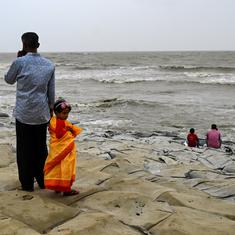The memory of the bombings and the postwar era is starting to fade. There are few survivors of the bombings alive today, but those who remain are still fighting for compensation and special assistance from the Japanese government. At the same time, there are those who do not let others know that they were survivors because of prejudice against those made ill by the bomb. Many continue to suffer, both physically and psychologically.
The survivors view themselves not as the last to suffer in World War II, but as the first to suffer the potential catastrophe of warfare in the atomic age. They are determined to do all they can to stop others from suffering as they have.
Japan in general is reluctant to openly debate whether it was necessary to drop the atomic bombs on Japan, but the Japanese people’s feelings are clear enough. Most cling to evidence that it could have been avoided; the Japanese media notes without comment the views of those (mostly Americans) who argue the bombings were necessary to end the war.
After the cataclysm of the war, a large majority of the Japanese public adopted a pacifist mindset. Japan even enshrined it in law in the form of Article 9 of its constitution, which renounced war and belligerency.
Opposition parties gained some support by taking such a stance, and even many supporters of the conservative Liberal Democratic Party (LDP) distrusted the military and wanted Japan to take advantage of the US military umbrella to protect the nation, short-circuiting the need for a large Japanese military establishment.
Over the past 20 years, though, the old anti-war opposition parties have faded, and nationalistic rhetoric has been more popular – not just with the public, but with the government.
Rightward lurch
The current leadership of the LDP – particularly the prime minister, Shinzō Abe – rose to power in the past 20 years precisely by pursuing a nationalist agenda. The extreme right in Japan is strong and there is a new generation of new right-wing politicians in the mainstream of conservative politics.
Today’s younger generation are sceptical of their elders' pacifism. The nationalist leadership of the LDP was also helped by the fact that the previous government, led by the Democratic Party of Japan, appeared to be largely incompetent at a time when Japan faced threats from North Korea and China.
Even though much of the Japanese public does not agree with the LDP’s nationalist platform, the party won big electoral victories by promising to replace the DPJ’s weakness with strong leadership – particularly on the economy, but also in foreign affairs.
Crossing the line
And yet, they may have taken it too far. Three very unpopular defence bills are currently making their way through the Japanese parliament. They are intended to allow the Japanese military to act in self-defence, to be deployed in support of allies if they come under attack, and to participate more fully in UN peacekeeping operations.
Given Abe’s well-known nationalist views, the bills were initially regarded as controversial but not surprising. The debate in parliament was driven by the “usual suspects” such as the Japanese Communist Party, and so was not taken seriously at first.
But unease soon started to ramp up, and has not abated. The government has been ambiguous about the circumstances in which the new powers could be used, and Abe and his supporters have failed to make a solid, non-belligerent case for the legislation. Worse, Abe has decided to force through the laws against mounting public opposition.
But it is unlikely that the LDP will be punished electorally for this affront to public opinion. It has more to fear from the failure of Abe’s much-ballyhooed economic strategy; even then, there is no effective opposition party to replace the LDP. So if a change ever comes, it will come from within the LDP itself.
The LDP’s nationalists are vocal, but they hardly represent all of Japan, and the controversy over the three defence bills proves as much. As the survivors of Hiroshima and Nagasaki have been saying since 1945, war in a nuclear age would be a disaster beyond our imagination – and whatever the nationalist agenda in Japan, China or elsewhere, we must not forget it.
This article was originally published on The Conversation.










